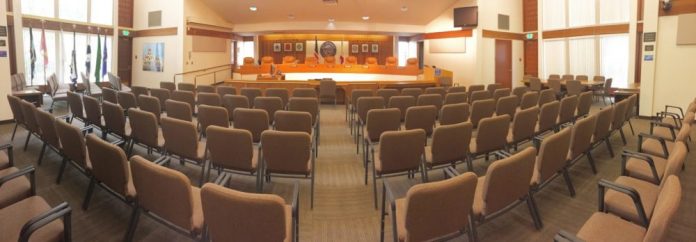A drive by any major parking lot in Gilroy may reveal a familiar site: large recreational vehicles out of shape and parked in one shaded corner, sometimes for several days. The phenomenon has become a growing nuisance for merchants and a health and enforcement headache for the city.
It’s a new cat-and-mouse routine for police and the itinerant homeless.
In August, Police Chief Scot Smithee gave a “Quality of Life” report to the council, in which he mapped out a plan to decrease homelessness in the city. Smithee told the council that the police department was dealing with an increase in recreational vehicles that violated city codes and needed to be towed.
At the Oct. 15 City Council meeting, the council approved an increase in fees from $500 to $1,000 for the police department to pay tow companies to disassemble abandoned recreational vehicles and motorhomes and tow them to junkyards.
The motion carried unanimously with five votes. Dion Bracco recused himself from the vote because his company, Bracco’s Towing, is one of those used in the police department’s rotation. Fred Tovar was absent. Daniel Harney moved for the vote, and Cat Tucker seconded the motion.
Bracco’s recusal didn’t prevent him from speaking up about the council’s action, claiming that if he spoke as a private business owner, he could avoid any conflict of interest.
Bracco said he was speaking on behalf of his company as a private citizen in favor of the fee increase. He said he spoke to the city attorney prior to the meeting to see if he would be able to speak, and got the green light.
Bracco said he felt it was necessary to speak publicly at the meeting because he considers himself an expert in his field. However, he recognized it was necessary that he recuse himself from the vote.
“I’m the only one on rotation now that tows the motorhomes, so the city will be paying me to tow them,” Bracco told the Dispatch. State conflict-of-interest laws require that elected officials shall not vote or participate in any way in decisions that benefit them financially.
Bracco’s towing company is part of the rotational tow list used by the police department and is not contracted by the department. When the police need towing services, they go down the list to ensure one company is not called more than others.
Smithee said during his report, “We’ll just absorb that cost in that salary savings for as long as we can. At some point, when that salary savings goes away, then we would have to budget this into our operational budget.”
The staff report said the fee increase will be enough to cover the cost of dissembling 25 vehicles, making the budget $25,000 that will initially come from the police department.
According to the city code, “an oversized vehicle may only be parked in the public right of way for 48 hours during any 14-day time interval.”
Jan Bernstein Chargin, board chair for the Gilroy Compassion Center, also spoke at the council meeting, urging the council members to consider the humanity of the people living in the vehicles being towed and destroyed.
“What I’d like to propose right now is if we’re going to find $25,000 for the enforcement side, we find an equivalent amount for the services side,” Chargin said at the meeting. “When somebody’s home is towed, that leaves that human being with no place to sleep.”
Shawn Weymouth, secretary at the Compassion Center, said she had witnessed Bracco’s tow company along with the police department removing a woman from her vehicle. This was in contrast to Bracco’s statement to the council.
“I have never towed a motorhome that has a family in it. It’s usually meth addicts. And our police department is really good,” Bracco said in his public comments. “They warn them, and they warn them, and they warn them.”
Weymouth was upset by what she said she witnessed and hoped the council would consider alternatives. “I get it. I love Gilroy too, Rolan. We’ve both been in Gilroy our whole lives, but we have to temper that with the humanity of it,” said Weymouth.
Mayor Roland Velasco asked the City Manager Gabriel Gonzalez if the council could get an update in four to six months on the progress of the fee increase. He said he wanted an update in mid-spring, in time for the budget update, on how many vehicles had been towed and what the cost were.
Tucker wanted to clarify what the motion was accomplishing. “What’s before us now is just to increase this fee; the other things can be talked about at budget time,” said Tucker.













